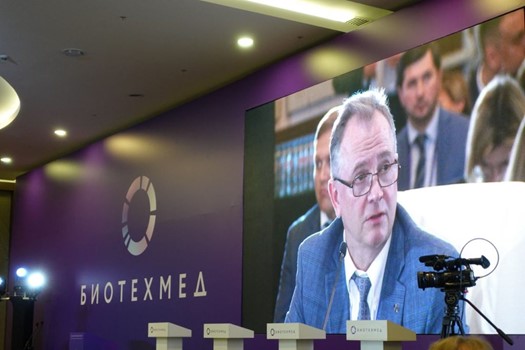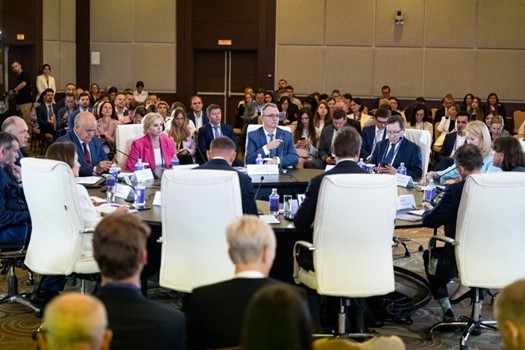Andrey Ivashchenko: “If we set ourselves such a goal, then by 2030 we will be able to replace most of the market for innovative drugs in the Russian Federation with drugs created by Russian developers”
Chairman of the Board of Directors of the ChemRar Group Andrey Ivashchenko took part in the business program of the Biotechmed-2023 forum, where, at various sites, together with key industry leaders and top officials of federal and regional authorities, state corporations, development institutions, academic institutes and universities of Russia Issues of development of the pharmaceutical and medical industry until 2030 were discussed.

The forum traditionally opened with a plenary session with the participation of Deputy Prime Minister of the Russian Federation — Minister of Industry and Trade of the Russian Federation Denis Manturov, Minister of Health of the Russian Federation Mikhail Murashko, Governor of the Krasnodar Territory Veniamin Kondratyev.
“As part of the new stage of the Development Strategy for the pharmaceutical and medical industry, we are working not only on innovative developments, but also on substances and small-scale chemistry. Today we set ourselves the task and goal of providing ourselves with our own components, our own substances from our own raw materials, in order to ensure technological independence in the field of pharmaceuticals, medical devices and medical equipment,” said Deputy Prime Minister and Head of the Ministry of Industry and Trade of Russia D.V. Manturov.
Over the past 10 years, Russian pharmaceuticals have made a big leap — many new factories have been built, manufacturers have learned to develop and bring to the market modern, high-quality generic drugs. But, unfortunately, the majority of the domestic market in monetary terms still remains with foreign “Big Pharma”; most of these companies are located in unfriendly countries, and last year many of them stopped clinical trials of their innovative drugs in Russia. This situation creates significant risks for both the domestic healthcare system and the EAEU countries.
Even if we manage to avoid defects in already registered foreign drugs, including using compulsory licensing, already within 5 years our patients will not be able to receive drugs of the next generation, for example those that are effective against new resistant forms of infectious and oncological diseases.
In this regard, the issue of creating our own lines for the development of innovative drugs in our country is acute. This corresponds to the new concept of technological development of the Russian Federation until 2030, adopted in Russia, where pharma is rightly included in the list of critical technologies.
In the draft action plan for the implementation of the Pharma-2030 strategy, presented by the Deputy Minister of Industry and Trade of the Russian Federation Ekaterina Priezzheva , bridging the gap between science and industry and the creation of domestic innovative drugs are identified as one of the key directions for the development of the industry until 2030, as well as the development of local competencies in production and export support. During the discussion of the plan, industry experts noted that it is necessary to improve local legislation and the regulatory system, introduce effective practices that in developed countries allow new drugs to be brought to market much faster, including the so-called “fast track” pre-registration and accelerated registration regimes , successfully tested in Russia during the Covid-19 pandemic within the framework of Government Decree No. 441.

Andrey Ivashchenko, Chairman of the Board of Directors of ChemRar Group, noted that the introduction of the best regulatory practices that have proven effective in the USA and Europe, such as scientific consulting with the regulator at the research stage, would allow domestic developers to concentrate their efforts and resources in accordance with priorities domestic healthcare system, increase the efficiency and success of clinical trials, and ensure that innovative drugs become available to patients 2-3 years earlier.
In addition, at specialized sessions with the participation of industry organizations and representatives of Rospatent and the Ministry of Industry and Trade of Russia, issues of bringing Russian and Eurasian legislation to the best practices of developed countries were actively discussed, especially in terms of combating unfair competition through the so-called “evergreen patents”, due to which developers are forced to spend significant resources on litigation challenging patents for minor modifications of the original drug that do not bring real innovation.
Experts from the industry and relevant departments also noted the need to adapt legislative norms and concentrate resources on the development of domestic innovative drugs, especially those aimed at treating diseases classified as “unmet medical needs.”
Participants see the most important condition for the innovative development of the industry as the need to increase the integration of science and industry, where there is a critical gap that has not yet been overcome, despite certain groundwork created within the framework of the Pharma2020 program. Considering that Russia has proven tools and programs to support scientific research, aimed, among other things, at subordinate organizations of the Ministry of Education and Science and the Ministry of Health of Russia, there is the potential to build them up and prioritize the development of innovative drugs that are in demand by the healthcare system.
Russian Health Minister Mikhail Murashko, during the plenary session of the forum, emphasized the department’s interest and openness to work in this direction: “We support not only investments, but also innovations. Innovations from both industrialists and scientists. The healthcare system forms an order for industry. We don’t feel like we’re in a dark room looking for a black cat.”
Denis Valentinovich Manturov also recalled the work of the «PharmMedInnovations» venture fund , which invests in early developments.
However, these measures are not yet enough to stimulate innovative import substitution. Over the past 3 years, the only specialized venture fund in Russia has invested in only a few projects, which is extremely small on the scale of the entire industry.
“Even if the fund directs all its funds to finance the gap in innovation between the science and industry (supporting phases 1-2 of clinical trials), they will only be enough for 10, maximum 15 projects, of which, according to statistics, 3-5 drugs will be successful, and for technological sovereignty in the pharmaceutical industry, one needs orders of magnitude more of its innovative drugs. In this regard, it seems to me that there should be several such venture funds in Russian pharma. Perhaps it is necessary to recapitalize the existing fund, but it is also necessary to create new venture funds that would specialize specifically in investing in developments at stage 1-2 of clinical trials — in that very valley of death, which almost no one goes to now,” says Andrey Ivashchenko.
The BIOTECHMED Forum is supported by the Ministry of Industry and Trade of the Russian Federation, the Ministry of Health of the Russian Federation, and the Administration of the Krasnodar Territory. The strategic partner of the forum is the Rostec State Corporation .
About the ChemRar Group
The ChemRar Group unites research, production and investment companies in the field of innovative pharmaceuticals with the aim of developing and commercializing innovative pharmaceuticals, diagnostics, prevention and new methods of treating life-threatening diseases, both in Russia and abroad.